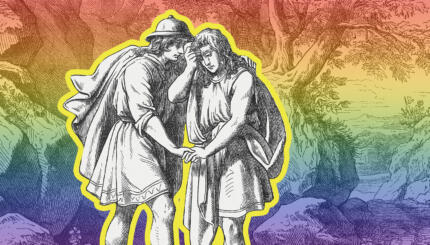Jewish tradition considers sex a sacred endeavor and places few limits on what partners may do together to enhance their pleasure. Sexuality is seen as a potential portal to the divine and an essential building block of couplehood provided it is expressed within certain boundaries — traditionally understood as heterosexual marriage but, in contemporary times, expanded to all types of marriage and even, by some authorities, certain types of non-marital relationships.
Is consuming pornography consistent with these values? From the perspective of Jewish law, consumption of pornography poses a number potential problems. For one, it typically goes hand in hand with masturbation which, for men at least, has historically been considered sinful. For another, it runs the risk of sparking impure thoughts, which the ancient rabbis banned both for intrinsic reasons and because they might lead to sinful action. Pornography also seems to run afoul of the Jewish value of modesty, or tzniut, which mandates a certain reserve or restraint in dress and overall conduct. And finally, modern pornography may pose problems from the standpoint of Jewish ethics, given that at least some sexually explicit content is produced in ways that are exploitative of the performers.
For all these reasons, Jewish authorities on the whole have taken a dim view of porn. Eric Yoffie, the former president of the Union for Reform Judaism, has said that the pervasiveness of pornography is a sign of moral crisis since it “debases the sexual act and detaches it from love and commitment.” Rabbi Shmuley Boteach, the best-selling author who has written approvingly of all manner of sex acts aimed at increasing pleasure and intimacy, nevertheless draws the line at pornography, even when used to stimulate lovemaking between married partners. “They may be making love while watching the film, but in spirit and in mind they might as well be with the people in the video,” he writes in Kosher Sex.
Porn and Masturbation
Though some contemporary authorities have taken a more lenient view, Jewish law is fairly explicit in barring masturbation for men. The source of this prohibition is sometimes attributed to the biblical figure Onan who, after being charged with propagating the family line by fathering children with his brother’s widow, Tamar, instead withdrew from her and ejaculated on the ground — a crime for which God took his life. Many commentators subsequently understood the prohibition on masturbation as barring the spilling (or wasting) of sperm. Others consider Onan’s sin to have been disregarding his duty to procreate with his late brother’s wife and see the source of the masturbation ban in concerns about ritual purity.
With your help, My Jewish Learning can provide endless opportunities for learning, connection and discovery.
Whatever the reasons for the prohibition, traditional Jewish sources also banned activities that might lead to it. The Talmud records a teaching (Niddah 13b) that anyone who intentionally causes an erection is ostracized by the community. Elsewhere, the Talmud goes further, stating that touching one’s own penis, even during urination, is prohibited. In Avodah Zarah 20a, the Talmud states that one may not look at things that might lead to arousal and thus to improper seminal emission, including a beautiful woman, a woman’s colored garments, and even animals when they are mating. Even if porn were not consumed specifically as a masturbatory aid, these sources would seem to forbid it for even running the risk of it.
Female masturbation is considered less problematic in Jewish tradition, as it doesn’t raise concerns about spilled seed. Rabbi Moshe Feinstein, a leading 20th century Orthodox authority, dismissed multiple grounds for objection to female masturbation, including that sexual thoughts might lead to actual transgressions. So for women at least, watching porn might still be an issue, but not for this reason.
Pornography and Impure Thoughts
While some Jewish sources directly tie concerns about gazing lustfully at a woman to concerns about improper emissions, not all of them do. In Tractate Shabbat, a teaching is ascribed to the school of Rabbi Yishmael that a certain biblical generation of Israelites required atonement because they “nourished their eyes with nakedness.” (The phrase in question, zanu eiyneyhem, could also be translated as “their eyes fornicated.”) Later in the same passage we learn that anyone who gazes upon a woman’s finger, it is as if they have looked at her genitals. The Shulchan Arukh, the medieval Jewish law code, formalized these prohibitions and added several more, including watching a woman do laundry, smelling a woman’s perfume, or walking behind her in the marketplace. These passages make no mention of such thoughts leading to actual sins.
These and other sources that bar looking at sexual images but do not mention a concern with illicit sexual behavior imply that the thoughts themselves are problematic. In Hebrew, this is known as hirhur arayot, literally “thoughts of nakedness” (or more generally hirhur aveirah, “thoughts of sin”). The source of this prohibition is often attributed to the verse in Numbers 15:39, which describes wearing tzitzit fringes as a mitzvah intended to remind the wearer not to follow the lustful urges of the heart and eyes. The Talmud (Berakhot 12b) teaches that this verse prohibits three types of thoughts: heresy, licentiousness and idol worship. Elsewhere the Talmud teaches: “Thoughts of transgression are worse than transgressions.” Commenting on that teaching, Maimonides writes: “Man sins only by his animal nature, whereas thinking is a faculty of man connected with his form — a person who thinks sinfully sins therefore by means of the nobler portion of his self.”
All of which suggests that the quality of one’s thoughts are of concern, even if they don’t directly lead to sin. So even if watching pornography did not lead to a sinful actions, the lustful thoughts that such material is designed to conjure are nevertheless problematic.
However, as with masturbation, it’s not clear that this prohibition applies to women. The sources cited above are all clearly aimed at barring men from thinking about or gazing at women. The Talmud also features an unusual story that seems to suggest sexual thoughts are not problematic when women are the ones thinking them. The story concerns Rabbi Yohanan, known to be the most beautiful among the ancient rabbis, who would go and sit by the bathhouse so that when women who have just immersed themselves after their menstrual cycles emerged, they would see him before they reunited with their husbands. Rabbi Yohanan reasoned that if the women had his beauty and Torah scholarship in mind as they had sex, their children would be beautiful and learned as well. Implanting thoughts of another man in the minds of women while they have sex with their husbands doesn’t seem to have troubled the Talmud, which reports only one challenge to Rabbi Yohanan’s practice from colleagues who worried that it might give him impure thoughts.
Tzniut, Or Modesty
Modesty is widely considered a core Jewish value, but its precise dimensions are defined in radically different ways, both historically and among contemporary Jewish communities. The word itself appears only twice in the Bible, once each in the latter two sections, the Prophets and the Writings. Micah 6:8 describes the three things God requires of human beings: “To do justice, and to love kindness, and to walk modestly with your God.” Proverbs 11:2 states that “wisdom is with those who are modest,” a verse on which the commentary Metsudat Tzion explains: “those who conceal themselves out of their great humility.”
The Talmud contains a number of teachings indicating that extreme concealment was a practice of the most learned and pious. We are told that two sages — Rabbi Yosei and Rabbi Yehuda HaNasi — never looked at their own genitalia. (Interestingly, a passage in Bava Metzia 84a compares the penis sizes of two other rabbis, so that abstention was evidently not universally observed.) Rabbi Yosei was also reputed to have claimed that “the walls of my house never saw the seams of my robe,” meaning that he was so modest he would only change his garments under the bed sheets. One of the most famous stories in the Talmud concerns a student who, ostensibly wanting to learn from his teacher, hid under his bed as the teacher had sex with his wife. When the teacher kicks him out, the student responds: “It is Torah, and I must learn.”
Even if done for noble or innocuous purposes (like getting dressed), Jewish sources tend to be restrictive when it comes to being naked or observing the naked body. This is unambiguously so in public settings. Deuteronomy 23:15 explicitly barred the ancient Israelites from exposing ervah — a Hebrew word that was understood by the rabbis in various ways, but in its plain meaning refers to nakedness. Even in private, some Jewish authorities take a restrictive approach. In some ultra-Orthodox communities today, even married couples will avoid gazing at each other naked, as required by various halachic authorities.
In liberal Jewish communities where standards of dress are far more relaxed, Jewish authorities have attempted to redefine the parameters of tzniut in ways that are more attuned to particular communal mores while still upholding the core value. In a 2017 paper, the Conservative movement’s legal authorities afforded wide latitude around the particulars of dress in deference to what is considered communally appropriate, while also emphasizing that one must be modest in one’s thoughts and careful in what one gazes at, noting that non-sexual imagery can also be eroticized. “The intent of the gaze matters a great deal,” the paper states. “A person ought to be sufficiently self-aware to avoid looking at something for the purpose of titillation.”
Jewish consumer ethics
Over the years there have been credible allegations of exploitation and mistreatment of performers in the adult industry, including charges of human trafficking and employment of underage actors. To the extent these allegations are true, consuming porn may be inconsistent with Jewish expectations of how consumers spend their money.
The Talmud states that one may not purchase stolen goods, a ruling codified by Maimonides in the Mishneh Torah. As exploiting or underpaying workers can be construed as a kind of thievery, some authorities might apply this prohibition to pornography that is produced in a manner that “steals” from actors by treating them improperly.
There’s also an issue in Jewish law about facilitating the sinful behavior of others. The classic source for this prohibition is the injunction in Leviticus 19:14 known as lifnei iver, which prohibits placing “a stumbling block before the blind.” This rule is generally understood as barring any behavior that would lead others to sin. The Talmud (Avoda Zara 65b) bars one from selling a garment woven with wool and linen to a non-Jew for fear that person might then turn around and sell it to a Jew. In the context of pornography, consuming adult videos may both enable the sinful behavior entailed in its production as well as expand the producer’s capacity to create material that would lead to any of the potential sins outlined above.
A More Permissive Approach
For all these reasons, Jewish authorities from across the denominational spectrum have generally taken a dim view of pornography. Some Jewish thinkers, however, have identified ways in which watching porn might be deemed consistent with Jewish values. In a lengthy treatment of the subject published by the Reconstructionist movement, Rabbi Ariel Wolpe outlines a series of questions one might consider in judging whether pornography is religiously appropriate. They include the ethics of its production, its potentially adverse effects on relationships and physical health, and whether it honors the holiness of sexuality. Rabbi Jonathan Crane, writing in the Reform movement’s 2014 volume on sexuality, The Sacred Encounter, suggests that Jewish tradition “favors permitting, if not encouraging, Jews to produce and consume some forms of erotic expressions for the purpose of invigorating marital relations, with perhaps more freedom in the verbal than visual arena.”
Explore other contemporary issues through a Jewish lens with our 8-part email series. Learn more and sign up here.



